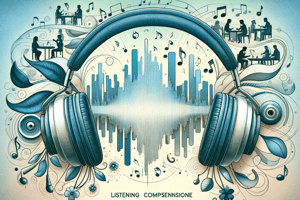Podcast
Questions and Answers
Can I start you off with something to ______?
Can I start you off with something to ______?
drink
I’ll have iced tea, ______.
I’ll have iced tea, ______.
please
How do you want the beef — rare, medium, or ______?
How do you want the beef — rare, medium, or ______?
well done
I’ll have the tomato ______ to start.
I’ll have the tomato ______ to start.
I’ll just have the fish, with ______ and a salad.
I’ll just have the fish, with ______ and a salad.
Are you ready to ______, or do you need a few minutes?
Are you ready to ______, or do you need a few minutes?
Notice how Anna stresses 'I’ll' and '______' to emphasize her choice.
Notice how Anna stresses 'I’ll' and '______' to emphasize her choice.
The ______ falls on the second word in each phrase.
The ______ falls on the second word in each phrase.
I’d like to go somewhere ______.
I’d like to go somewhere ______.
How about the ______? Or we could rent a cabin on the lake.
How about the ______? Or we could rent a cabin on the lake.
I want to ______ this winter.
I want to ______ this winter.
Dogs are more ______ than cats.
Dogs are more ______ than cats.
The structure of the sentences includes noun/s plus 'is/are more' plus ______ plus 'than'.
The structure of the sentences includes noun/s plus 'is/are more' plus ______ plus 'than'.
When asking for an opinion, you can say, 'Should we take a taxi or a _____?'
When asking for an opinion, you can say, 'Should we take a taxi or a _____?'
I need to take care of the broken ______.
I need to take care of the broken ______.
Every single ______ is a lot!
Every single ______ is a lot!
Clothing sizes usually come in small, medium, and _____ sizes.
Clothing sizes usually come in small, medium, and _____ sizes.
To indicate a preference for a different option, one might say, 'I’d rather have it in a _____.'
To indicate a preference for a different option, one might say, 'I’d rather have it in a _____.'
Good point here means 'I ______ with you.'
Good point here means 'I ______ with you.'
The phrase 'How much is it?' is asking for the _____ of an item.
The phrase 'How much is it?' is asking for the _____ of an item.
In the sentence, 'Let’s take a bus,' the word 'let’s' is a suggestion that means 'I think we should _____ this.'
In the sentence, 'Let’s take a bus,' the word 'let’s' is a suggestion that means 'I think we should _____ this.'
'Oh!' is an exclamation used to express _____ or surprise.
'Oh!' is an exclamation used to express _____ or surprise.
In a negative question, such as 'Isn’t that a bus _____ over there?', the speaker usually expects an affirmative answer.
In a negative question, such as 'Isn’t that a bus _____ over there?', the speaker usually expects an affirmative answer.
The word 'or' in a question indicates a _____ between choices.
The word 'or' in a question indicates a _____ between choices.
Flashcards are hidden until you start studying
Study Notes
Ordering Food and Drinks
- Ralph and Anna order drinks: iced tea for Ralph and lemonade for Anna.
- Ralph orders tomato soup, roast beef (well done) with mashed potatoes and peas.
- Anna opts for fish with potatoes and a salad.
- The waiter confirms understanding by asking if they are ready to order or need more time.
Language Features in Ordering
- The question “Can I start you off with something to drink?” shows rising intonation indicative of a yes/no question.
- Key food items are emphasized when Ralph lists his order, indicating importance.
- Stress on "I’ll" and "lemonade" for Anna emphasizes her personal choice.
Expressing Choices and Comparisons
- The phrase “How do you want the beef?” indicates a choice with an unordered list of options.
- "Dogs are more loyal than cats" presents a comparative structure: subject + is/are more + adjective + than + subject.
Agreeing and Emphasizing Points
- “Yeah, you’re right” reveals informal agreement, with blending pronunciation for a casual tone.
- Emphasis on "Every single day" stresses frequency, while "Good point" signifies agreement.
Vacation Planning Dialogue
- Jake and Melissa debate vacation ideas, expressing preferences for warm destinations like the beach or skiing during winter.
- “Try on” is identified as a separable phrasal verb, highlighting its use in casual conversation.
Transportation Discussion
- Joyce and Bill discuss transportation options to the mall, weighing taxi versus bus.
- The expression “Should we take a taxi or a bus?” seeks opinions on the better choice.
- The conversation includes elements of urgency as they try to catch an approaching bus and acknowledge missed opportunities.
Studying That Suits You
Use AI to generate personalized quizzes and flashcards to suit your learning preferences.





